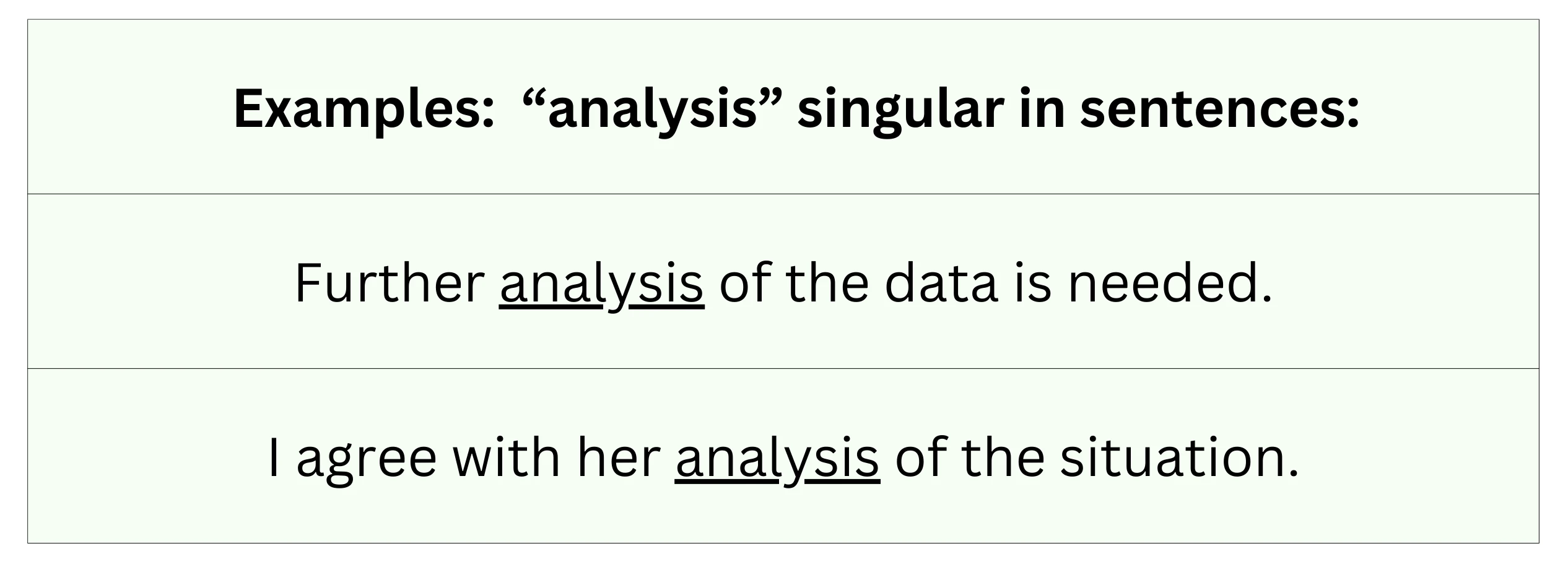What’s the plural of “analysis”?
An analysis is a “detailed study or examination of something in order to understand more about it; the result of the study.” Its meaning is similar to assess or evaluate.
The research team published a complex analysis of the results.
We need to conduct further analyses before drawing a conclusion.
We need to conduct further analysis before drawing a conclusion. (incorrect for plural)
The report included one detailed analyses of the market.
- Analysis is singular.
- Analyses (uh-nal-uh-seeze) is plural.
Forms of analysis
- To analyze (or analyse in UK English) is the verb form of analysis.
- Analytic and analytical are adjective forms.

Most plural nouns in English end in ‘-s’ or ‘-es’. Nouns that end in s/es are regular and simple to form: all you have to do is add ‘s’ or ‘es’! We see this with most nouns: ‘dog’ plural is ‘dogs’, cat turns to cats, book is books, ‘table’/ ‘tables’, and so forth. Plural nouns ending in anything other than ‘s’ or ‘es’ are irregular. To learn more about irregular plurals, check our deep dive here.
Greek pluralization rules
Despite Greek nouns ending with ‘-es’ as plurals, they are still irregular, since, instead of adding ‘-es’ to the word’s ending, the ‘-es’ is swapped with ‘-is’ from its singular case. Because ‘-es’ replaces the suffix of its singular noun form (the -is), this changes how we spell and pronounce ‘analyses’ as a plural and other Greek words.
Analysis/analyses share singular/plural noun patterns with many Greek words: diagnosis, crisis, synopsis, oasis, synthesis, thesis, and nemesis all end in -sis as singular nouns. Each similarly mimics the same plural form; i.e., substitutes the -sis with -ses: diagnoses, crises, oases, syntheses, theses, nemeses (bases, hypotheses, paralyses, axes, the Greek nouns list goes on).
| singular | plural |
|---|---|
| crisis | crises |
| diagnosis | diagnoses |
| oasis | oases |
| synopsis | synopses |
| thesis | theses |
Apart from being irregular plural nouns, these words have another thing in common: they’re all Greek. Greek occupies roughly 5% of the English language. Most English words come from the Germanic languages, which include Dutch, German, Old Norse, Old Frisian, and a few others.
For the plural of analysis, change the -sis ending to -ses: analyses.
Analysis/analyses example sentences
| Word Form | Examples |
|---|---|
| Other | As a result, only the city should determine where the statue would be moved, the judge explained in the court order analysis. (Simrin Singh, CBS News, 27 Oct. 2022)
The scale of the disruption to American education is evident in a district-by-district analysis of test scores. (Los Angeles Times, 28 Oct. 2022) During analyses of future weather patterns, a meteorological team has detected climate changes that may produce a category five hurricane. The factory owner made several budget analyses to decide which departments could be reduced in size. |
Synonyms of analysis
- inquiry
- investigation
- search
- study
- test
- assessment
- evaluation
- dissection
- examination
Worksheet: Greek nouns
According to the post, what is the correct plural form of “analysis”?
Based on the usage notes, which sentence demonstrates an INCORRECT use of the singular or plural form of “analysis”?
The post states that the plural form “analyses” is pronounced:
Words like analysis, crisis, and thesis, which change their ending from ‘-sis’ to ‘-ses’ to form the plural, primarily originate from which language?
According to the post, which of the following words also forms its plural by changing the ‘-sis’ ending to ‘-ses’?
The research team published a detailed of the results.
We need to conduct further before drawing a conclusion.
The report included one detailed of the market.
The medical team presented several key of the test results.
The committee reviewed multiple of the proposed budget.
FAQs
Q: What is the plural of “analysis”?
Q: How do you spell the plural form?
Q: How is the plural form pronounced?
Q: Why is the plural form irregular?
Q: When should I use “analysis” vs “analyses”?
Sources
- Wordsinasentence.com analyses.
- Merriam-webster.com, analysis.
- Wikipedia, Noah Webster.
- Merriam-webster, analysis.
- Etymology of analysis.










